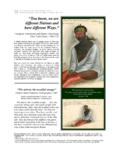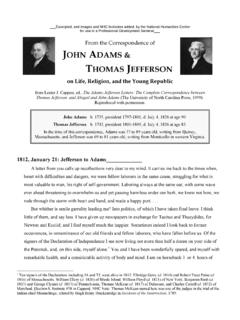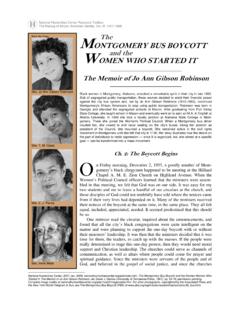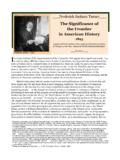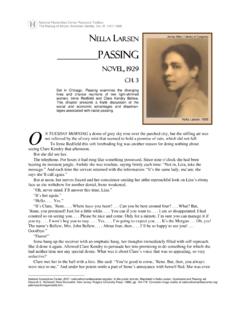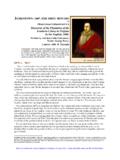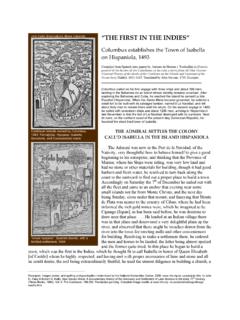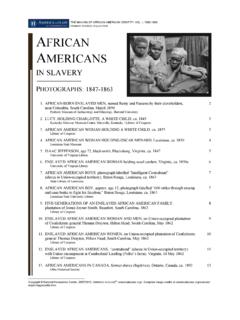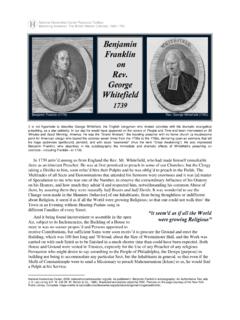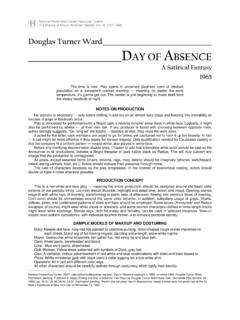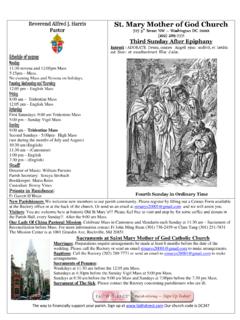Transcription of Alain Locke The Reiss Partnership Enter the New …
1 National Humanities Center Resource Toolbox The Making of African American Identity: Vol. III, 1917-1968. The Reiss Partnership Alain Locke Enter the new Negro Survey Graphic, March 1925: Harlem: Mecca of the new Negro Alain Locke (1886-1954) was born and raised in Philadelphia. He graduated from Harvard and continued his studies in Europe as the first African American Rhodes Scholar. After teaching English at Howard University for four years, he returned to Harvard in 1916 to begin work on a in philosophy, which he obtained in 1918. He rejoined the Howard faculty and taught there until his retirement in 1953. In 1925 he edited a special edition of the magazine Survey Graphic, devoted exclusively to the life of Harlem. He later expanded it into an anthology, the new Negro, which became the manifesto of the Harlem Renaissance, or as some critics prefer to call it, the new Negro Movement. In the essay provided here Locke captures the hope and optimism of a people who have discovered "a new vision of opportunity.
2 " Cover design by Winold Reiss I. *. n the last decade something beyond the watch and guard of statistics has happened in the life of the American Negro and the three norms who have traditionally presided over the Negro problem have a changeling in their laps. The Sociologist, The Philanthropist, the Race-leader are not unaware of the new Negro, but they are at a loss to account for him. He simply cannot be swathed in their formulae. For the younger generation is vibrant with a new psychology; the new spirit is awake in the masses, and under the very eyes of the professional observers is transforming what has been a perennial problem into the progressive phases of contemporary Negro life. Could such a metamorphosis have taken place as suddenly as it has appeared to? The answer is no; not because the new Negro is not here, but because the Old Negro had long become more of a myth than a man. The Old Negro, we must remember, was a creature of moral debate and historical controversy.
3 His has been a stock figure perpetuated as an historical fiction partly in innocent sentimentalism, partly in deliberate reactionism. The Negro himself has contributed his share to this through a sort of protective social mimicry forced upon him by the adverse circumstances of dependence. So for generations in the mind of America, the Negro has been more of a formula than a human being a something to be argued about, condemned or defended, to be kept down, or in his place, or helped up, to be worried with or worried over, harassed or patronized, a social bogey or a social burden. The thinking Negro even has been induced to share this same general attitude, to focus his attention on controversial issues, to see himself in the distorted perspective of a social problem. His shadow, so to speak, has been more real to him than his personality. Through having had to appeal from the unjust stereotypes of his oppressors and traducers to those of his liberators, friends and benefactors he has subscribed to the traditional positions from which his case has been viewed.
4 Little true social or self-understanding has or could come from such a situation. But while the minds of most of us, black and white, have thus burrowed in the trenches of the Civil War and Reconstruction, the actual march of development has simply flanked these positions, necessita- ting a sudden reorientation of view. We have not been watching in the right direction; set North and South on a sectional axis, we have not noticed the East till the sun has us blinking. *. National Humanities Center, 2007: ; added 2010. Copyright holder and status undetermined; permission pending. Footnotes added by NHC. Complete image credits at Recall how suddenly the Negro spirituals revealed themselves; suppressed for generations under the stereotypes of Wesleyan hymn harmony, secretive, half-ashamed, until the courage of being natural brought them out and behold, there was folk-music. Similarly the mind of the Negro seems suddenly to have slipped from under the tyranny of social intimidation and to be shaking off the psychology of imitation and implied inferiority.
5 By shedding the old chrysalis of the Negro problem we are achieving something like a spiritual emancipation. Until recently, lacking self-understanding, we have been almost as much of a problem to ourselves as we still are to others. But the decade that found us with a problem has left us with only a task. The multitude perhaps feels as yet only a strange relief and a new vague urge, but the thinking few know that in the reaction the vital inner grip of prejudice has been broken. With this renewed self-respect and self-dependence, the life of the Negro community is bound to Enter a new dynamic phase, the buoyancy from within compensating for whatever pressure there may be of conditions from without. The migrant masses, shifting from countryside to city, hurdle several generations of experience at a leap, but more important, the same thing happens spiritually in the life- attitudes and self-expression of the Young Negro, in his poetry, his art, his education and his new outlook, with the additional advantage, of course, of the poise and greater certainty of knowing what it is all about.
6 From this comes the promise and warrant of a new leadership. As one of them has discerningly put it: We have tomorrow Yesterday, a night-gone thing Bright before us A sun-down name. Like a flame. And dawn today Broad arch above the road we came. We march! 1. This is what, even more than any most creditable record of fifty years of freedom, requires that the Negro of today be seen through other than the dusty spectacles of past controversy. The day of aunties, . uncles and mammies is equally gone. Uncle Tom and Sambo have passed on, and even the Colonel . and George play barnstorm roles from which they escape with relief when the public spotlight is off. The popular melodrama has about played itself out, and it is time to scrap the fictions, garret the bogeys and settle down to a realistic facing of facts. F IRST we must observe some of the changes which since the traditional lines of opinion were drawn have rendered these quite obsolete. A main change has been, of course, that shifting of the Negro population which has made the Negro problem no longer exclusively or even predominantly Southern.
7 Why should our minds remain sectionalized, when the problem itself no longer is? Then the trend of migration has not only been toward the North and the Central Midwest, but city-ward and to the great centers of industry the problems of adjustment are new, practical, local and not peculiarly racial. Rather they are an integral part of the large industrial and social problems of our present-day democracy. And finally, with the Negro rapidly in process of class differentiation, if it ever was warrantable to regard and treat the Negro en masse, it is becoming with every day less possible, more unjust and more ridiculous. The Negro, too, for his part, has idols of the tribe to smash. If on the one hand the white man has erred in making the Negro appear to be that which would excuse or extenuate his treatment of him, the Negro, in turn, has too often unnecessarily excused himself because of the way he has been treated. The intelli- gent Negro of today is resolved not to make discrimination an extenuation for his shortcomings in performance, individual or collective; he is trying to hold himself at par, neither inflated by sentimental allowances nor depreciated by current social discounts.
8 For this he must know himself and be known for precisely what he is, and for that reason he welcomes the new scientific rather than the old sentimental interest. Sentimental interest in the Negro has ebbed. We used to lament this as the falling off of our 1. Langston Hughes, Youth, ca. 1924. National Humanities Center Alain Locke , Enter the new Negro, Survey Graphic, March 1925 2. friends; now we rejoice and pray to be delivered both from self-pity and condescension. The mind of each racial group has had a bitter weaning, apathy or hatred on one side matching disillusionment or resentment on the other; but they face each other today with the possibility at least of entirely new mutual attitudes. It does not follow that if the Negro were better known, he would be better liked or better treated. But mutual understanding is basic for any subsequent cooperation and adjustment. The effort toward this will at least have the effect of remedying in large part what has been the most unsatisfactory feature of our present state of race relationships in America, namely the fact that the more intelligent and representative elements of the two race groups have at so many points got quite out of vital touch with one another.
9 The fiction is that the life of the races is separate, and increasingly so. The fact is that they have touched too closely at the unfavorable and too lightly at the favorable levels. While inter-racial councils have sprung up in the South, drawing on forward elements of both races, in the Northern cities manual laborers may brush elbows in their everyday work, but the community and business leaders have experienced no such interplay or far too little of it. These segments must achieve contact or the race situation in America becomes desperate. Fortunately this is happening. There is a growing realization that in social effort the cooperative basis must supplant long-distance philanthropy, and that the only safeguard for mass relations in the future must be provided in the carefully maintained contacts of the enlightened minorities of both race groups. In the intellectual realm a renewed and keen curiosity is replacing the recent apathy; the Negro is being carefully studied, not just talked about and discussed.
10 In art and letters, instead of being wholly caricatured, he is being seriously portrayed and painted. To all of this the new Negro is keenly responsive as an augury of a new democracy in American culture. He is contributing his share to the new social understanding. But the desire to be understood would never in itself have been sufficient to have opened so completely the protectively closed portals of the thinking Negro's mind. There is still too much possibility of being snubbed or patronized for that. It was rather the necessity for fuller, truer, self-expression, the realization of the unwisdom of allowing social discrimination to segregate him mentally, and a counter-attitude to cramp and fetter his own living and so the spite-wall that the intellectuals built over the color-line has happily been taken down. Much of this reopening of intellectual contacts has centered in New York and has been richly fruitful not merely in the enlarging of personal experience, but in the definite enrichment of American art and letters and in the clarifying of our common vision of the social tasks ahead.
